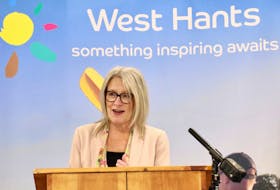As the #MeToo movement topples a growing number of Canadian politicians accused of sexual harassment, a local women’s advocate is pausing to reflect.
Shelley Curtis-Thompson, executive director of the Pictou County women’s Resource and Sexual Assault Centre, says that abuse victims who come forward are more likely to be believed as #MeToo has radically changed the culture.
“What’s new is that women are coming together in response to having some very public cases of people in power admitting that they acted in a sexually inappropriate way, like Trump,” said Curtis-Thompson.
While victims are receiving more support and alleged perpetrators are promptly booted from positions of power across Canada, the #MeToo movement has not been behind a slight increase in people seeking help at the women’s shelter.
Rather, the uptick is thanks to funding under the provincial sexual violence prevention strategy, which happens to coincide with #MeToo.
From Oct. 1 to Dec. 31 last year, the women’s centre offered support to its clients on 102 occasions, such as helping them to report abuse or connecting them with other services locally.
The centre offered one-to-one counselling 22 times plus 15 group counselling sessions over this same time period, according to Curtis-Thompson.
During the last three months the centre has also been active in the community, teaching 56 Grade 9 students about healthy relationships and running a workshop on human trafficking. Mentally disabled adults have received training around healthy sexual relations.
Both female and male clients have benefited from yoga programs, decreasing stress for the women and raising men’s self-awareness.
“There has been a collective effort across the province, including in Pictou County, to raise awareness and engage in conversations about prevention,” said Curtis-Thompson. “That investment locally has resulted in more survivors coming forward.”
However, provincial funding is due to end on March 31. First implemented in 2015, Curtis-Thompson and her colleagues knew it would not last forever.
The centre is planning a new grant application focusing on supporting community agencies and group programs and the women’s centre will keep offering support to people in the county.
Other local groups offering support to people needing help include the Tearmann Society for Abused Women and the Centre for Sexual Health.
This means that people who have been abused and harassed will still be believed and helped.
“Most people who are making allegations of harassment and harm are indeed telling the truth,” said Curtis-Thompson.
The province defines sexual violence as any unwanted, coerced, or non-consensual act aimed at exerting power and control over others.
This can include rape, sexual assault and abuse, incest, exploitation and human trafficking.
It also includes sexual harassment and catcalling, indecent exposure, stalking, showing or distributing demeaning sexual imagery, and online harassment.
People from all genders can be impacted by sexual violence, but women, children and LGBTQ people tend to suffer the most.

![['<p>100 Women Who Care Pictou County held its quarterly meeting recently with Big Brothers Big Sisters Pictou County being its most recent recipient of $13,500. The evening included presentations from other nominees: the Pictou County Fuel Fund and the Walter Duggan School Fund Project. Here, from the left: Jim McKenna, chair Pictou County Fuel Fund; Shelley Curtis-Thompson, executive director of the Pictou County Women’s Resource and Sexual Assault Centre, a past recipient from 100 Women Who Care; Jordan Cromwell, Big Brothers Big Sisters Pictou County, and Dawn Barrington-Hodgson of the Walter Duggan School Fund Project.</p>']](https://saltwire.imgix.net/quarterly-meeting-3159039.jpg?cs=srgb&fit=crop&h=568&w=847&dpr=1&auto=format%2Ccompress%2Cenhance)







